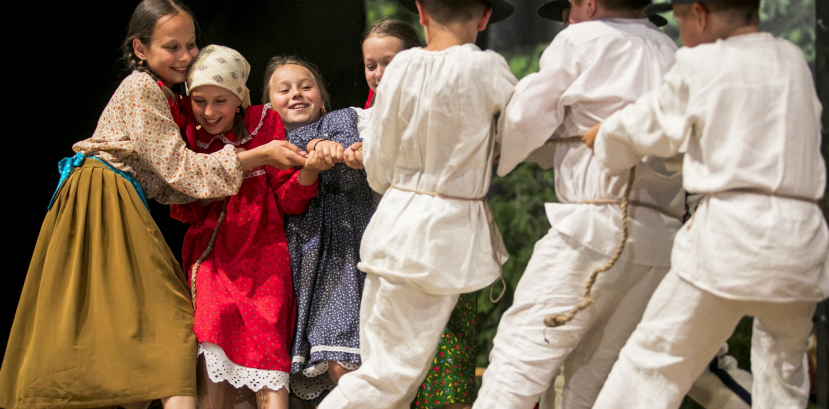A series of educational videos that aim to present issues concerned with the child in a traditional folk culture setting, and to discuss one of the most basic elements in stage performances by Polish ensembles participating in the International Festival of Children’s Folk Ensembles FESTIVAL OF THE CHILDREN OF MOUNTAINS.
Since the very beginning of the event, which was originated in 1992, the organisers have wished for it to be a place of shared fun as experienced in the spirit of a child’s natural joy. A child's world is radically different from the adults’ world, and the difference lies in childlike sensitivity, imagination, and conception of reality. THE CHILDREN OF THE MOUNTAINS - like all children in the world - love to play... They often engage in fun activities while doing chores, duties and tasks related to their position in the family. They play in a mountain pasture, a meadow, on the river, a countryside road or in a family cottage. They watch the elderly, nature, strangers and one another. They develop ludic codes communicable all over the world. While at play they are straightforward and genuine.
The goal of the series “Little geese, come home!” is to show various expressions of children’s folklore by presenting archive materials and contemporary recordings involving both past and future festival participants, as well as statements by festival guests, including not only specialists and instructors, but also children themselves. Thus we will have an opportunity to view the subject matter from two different viewpoints: the one of stage performance creators and authors, and the one of performers themselves.
The goal of the series “Little geese, come home!” is to show various expressions of children’s folklore by presenting archive materials and contemporary recordings involving both past and future festival participants, as well as statements by festival guests, including not only specialists and instructors, but also children themselves. Thus we will have an opportunity to view the subject matter from two different viewpoints: the one of stage performance creators and authors, and the one of performers themselves.
EPISODE 1: FESTIVAL WITH A UNIQUE FORMULA

The reasons for this, as well as for the power and timelessness of this uniquely devised formula will be discussed by the guests of the first episode of the educational videos series “Little geese, come home! Play in the child’s world”: Marek Harbaczewski, Benedykt Kafel, Anna Olesińska and Bożena Gierczyk; their statements will be supplemented with reflections by Józef Broda from the 2016 interview conducted by Antoni Malczak, the Festival director (1992-2019), and Małgorzata Kalarus, the head of the FESTIVAL OF THE CHILDREN OF MOUNTAINS organisation office (2006-2019).
EPISODE 2: CHILDREN'S FOLKLORE ON STAGE. A CONVERSATION IN THE MOTHER'S CHAMBER


EPISODE 3: PROGRAMME OF A CHILDREN'S FOLK ENSEMBLE. CHALLENGES TO THE INSTRUCTOR

This subject is discussed by Oskar Kolberg Award winners and experts affiliated with the Polish section of CIOFF: Michalina Wojtas – an educator, choreographer, folk ensemble instructor, and Benedykt Kafel – an ethnographer, member of the FESTIVAL’S International Artistic Committee since the first edition in 1992. The guests’ statements about what ancient games looked like, manners of rendering them on stage, places in which to look for inspiration while developing programmes, pitfalls to avoid, as well as forms and ways of working with children in different age groups - all these are illustrated with archive clips and programme excerpts straight from the FESTIVAL OF THE CHILDREN OF MOUNTAINS stage.
EPISODE 4: PLAY IN EDUCATION AND IN WORK WITH THE ENSEMBLE

We are visiting the guests of this episode while they are having their ensemble practice sessions at Maria Konopnicka Primary School in Zasadne and the Orava Culture Centre in Jabłonka, and so we are offered an opportunity to watch the children’s natural space in which they work on a daily basis, preparing programmes and learning... through play.
EPISODE 5: PLAY THROUGH A CHILD'S EYES

And for smiles like this as well as the interview we are grateful to Natalia, Paulina, Martyna, Zuzia, Nadia and Emilka from MAŁOLIPNICANIE, Olga, Łucja, Magda, Ewa, Antek, Martyna, Ania and Julka from ZASADNIOKI, and Alicja, Wojtek, Filip and Kacper from our SOKÓŁ family!
EPISODE 6: HOW AND WHAT TO PLAY. EXAMPLES OF PLAY & GAMES


EPISODE 7: PROBLEMS CONCERNED WITH RENDERING CHILDREN’S FOLKLORE ON STAGE

The lecture also addresses subjects concerned with a textual-musical repertoire, singing and dancing, direction, a local dialect, dress and props, i.e. those elements that most often appear during performances and programme discussions. We wish you enjoyable performances and see you at the Festival stage!
Conception of the series: Marek Harbaczewski
Project coordination: Małgorzata Mikulska
Recording: TWORZYWO-PRODUKCJA
The recordings make use of archive audio-video, photo and graphic materials owned by the SOKÓŁ Małopolska Culture Centre in Nowy Sącz, which were created during the previous editions of the FESTIVAL OF THE CHILDREN OF MOUNTAINS and the Congress of Regional Cultures.
This series of recordings has been created as part of the project "FESTIVAL OF THE CHILDREN OF MOUNTAINS - virtual and available" co-financed by the Ministry of Culture, National Heritage and Sport.
Project coordination: Małgorzata Mikulska
Recording: TWORZYWO-PRODUKCJA
The recordings make use of archive audio-video, photo and graphic materials owned by the SOKÓŁ Małopolska Culture Centre in Nowy Sącz, which were created during the previous editions of the FESTIVAL OF THE CHILDREN OF MOUNTAINS and the Congress of Regional Cultures.
This series of recordings has been created as part of the project "FESTIVAL OF THE CHILDREN OF MOUNTAINS - virtual and available" co-financed by the Ministry of Culture, National Heritage and Sport.

